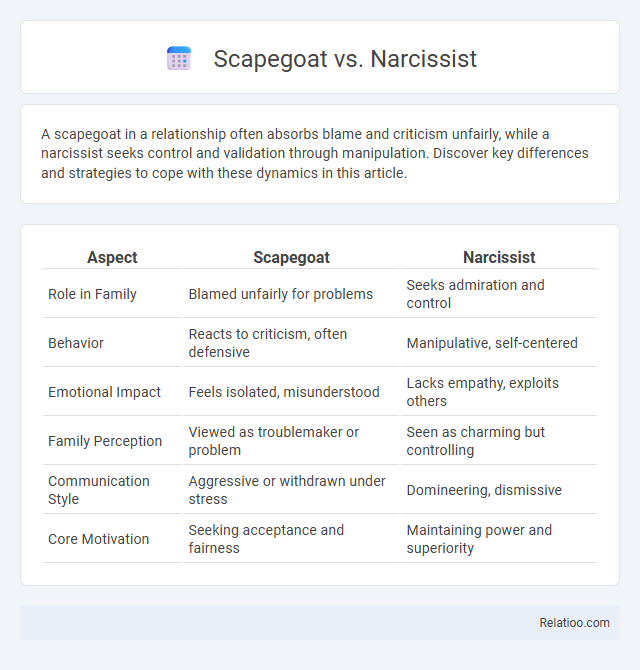A scapegoat in a relationship often absorbs blame and criticism unfairly, while a narcissist seeks control and validation through manipulation. Discover key differences and strategies to cope with these dynamics in this article.
Table of Comparison
| Aspect | Scapegoat | Narcissist |
|---|---|---|
| Role in Family | Blamed unfairly for problems | Seeks admiration and control |
| Behavior | Reacts to criticism, often defensive | Manipulative, self-centered |
| Emotional Impact | Feels isolated, misunderstood | Lacks empathy, exploits others |
| Family Perception | Viewed as troublemaker or problem | Seen as charming but controlling |
| Communication Style | Aggressive or withdrawn under stress | Domineering, dismissive |
| Core Motivation | Seeking acceptance and fairness | Maintaining power and superiority |
Understanding the Scapegoat and Narcissist Roles
Understanding the roles of scapegoats and narcissists reveals distinct psychological dynamics; scapegoats are unfairly blamed to divert attention from the narcissist's manipulative behavior. Your awareness of these roles helps in identifying scapegoating patterns where the narcissist projects their flaws onto others to maintain control and avoid accountability. Recognizing these dynamics is crucial for setting boundaries and addressing emotional manipulation effectively.
Key Traits of a Scapegoat
A scapegoat exhibits key traits such as accepting blame for others' mistakes, enduring unfair criticism, and consistently facing rejection within group dynamics. Unlike narcissists who seek admiration and control, scapegoats internalize negative feedback and often struggle with low self-esteem due to targeted scapegoating behaviors. Scapegoating involves a psychological mechanism where the scapegoat is unjustly blamed to deflect responsibility from the true source of problems.
Defining Narcissistic Behavior
Narcissistic behavior is characterized by an inflated sense of self-importance, a constant need for admiration, and a lack of empathy toward others. In contrast, scapegoating involves unfairly blaming an individual or group for problems, often to deflect responsibility or avoid accountability. While narcissists may employ scapegoating tactics to manipulate and control others, scapegoating itself is a broader social or interpersonal dynamic not limited to narcissistic personalities.
Family Dynamics: Scapegoats and Narcissists
In family dynamics, the scapegoat often becomes the target of blame and criticism, diverting attention from the narcissist's controlling and manipulative behavior. Your role as the scapegoat may involve absorbing family conflicts caused by the narcissist's need for validation and dominance. Understanding scapegoating helps identify toxic patterns where the narcissist maintains power by invalidating others and projecting faults onto a vulnerable family member.
Psychological Impact on Scapegoats
Scapegoats in psychological contexts endure intense emotional distress, often internalizing blame imposed by narcissistic individuals who deflect responsibility through scapegoating behaviors. The relentless targeting leads to diminished self-esteem, chronic anxiety, and symptoms akin to trauma, which can result in lasting psychological scars. Understanding the dynamics of narcissistic scapegoating reveals the critical need for therapeutic interventions focused on rebuilding identity and resilience in scapegoats.
Manipulation Tactics Used by Narcissists
Narcissists employ manipulation tactics such as gaslighting, blame-shifting, and emotional exploitation to maintain control and obscure their true intentions. Scapegoating involves unfairly attributing blame to a designated individual, often orchestrated by narcissists to divert attention from their own faults. Understanding these dynamics reveals how narcissists exploit scapegoating to manipulate perceptions and undermine others.
Common Interactions between Scapegoat and Narcissist
Scapegoats often endure blame and criticism from narcissists, who deflect their own faults onto others to maintain self-image. Narcissists manipulate scapegoats by exploiting their vulnerability, fostering dependency while undermining their self-esteem. This toxic dynamic perpetuates emotional abuse, where scapegoating serves as a tool for narcissists to control and dominate relationships.
Breaking the Cycle of Abuse
Breaking the cycle of abuse involves understanding the distinct roles of scapegoats, narcissists, and the dynamic of scapegoating within toxic relationships. Narcissists often manipulate family members or partners by projecting blame onto the scapegoat, who absorbs criticism and emotional pain unjustly. Effective intervention focuses on empowering the scapegoat through therapy and boundary-setting to dismantle patterns of scapegoating and decrease narcissistic control.
Healing and Recovery for Scapegoats
Scapegoating involves unfairly blaming an individual, often a scapegoat, who internalizes this role and suffers emotional damage due to narcissistic manipulation. Healing for scapegoats requires understanding the psychological dynamics of narcissistic abuse, reclaiming self-worth, and establishing boundaries to break free from toxic patterns. Your recovery process benefits greatly from therapeutic support tailored to dismantle scapegoating cycles and reinforce emotional resilience.
Setting Boundaries with Narcissists
Setting boundaries with narcissists is crucial due to their tendency to manipulate and exploit others, often projecting blame onto scapegoats within relationships or social groups. Understanding scapegoating helps identify how narcissists shift responsibility onto others, deflecting accountability and preserving their inflated self-image. Effective boundaries involve clear communication, consistent enforcement, and limiting emotional engagement to prevent narcissistic abuse and protect personal well-being.

Infographic: Scapegoat vs Narcissist
 relatioo.com
relatioo.com